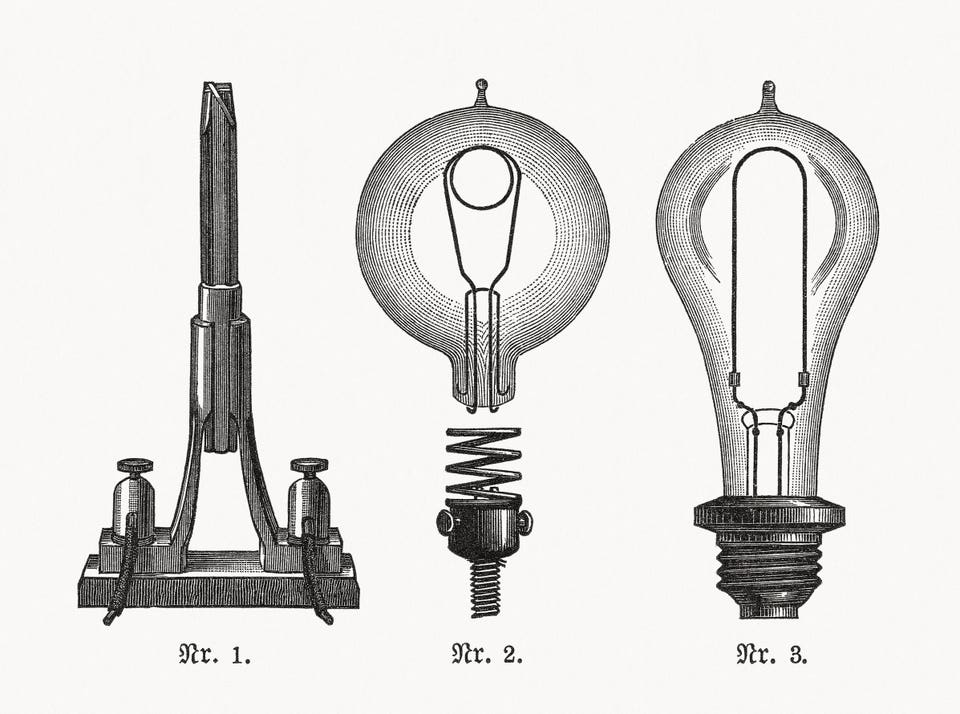Forbes Small Business Entrepreneurs Drawing Inspiration From Thomas Edison: 3 Essential Lessons For Startup Founders Abdo Riani Senior Contributor Opinions expressed by Forbes Contributors are their own. I share tips about launching, validating and growing startups. Following May 31, 2023, 09:36am EDT | Press play to listen to this article! Got it! Share to Facebook Share to Twitter Share to Linkedin Like Edison, founders must be tenacious, adaptable, and committed to solving problems.
By drawing . . .
[+] inspiration from his legacy, startup founders can apply these lessons to their own ventures, increasing their chances of making a lasting impact and leaving their mark on the world. getty Thomas Edison, one of history’s greatest inventors and entrepreneurs, left a big mark on the world through his relentless pursuit of innovation. His experience and practices offer valuable lessons for today’s startup founders, who face similar challenges in their quest to build successful businesses out of innovative technology.
In this article, we explore three important lessons that startup founders can learn from the story of Thomas Edison: 1. Embrace Failure As A Stepping Stone To Success: “I have not failed. I’ve just found 10,000 ways that won’t work.
” – Thomas A. Edison Edison’s story is a testament to the power of perseverance in the face of failure. His most famous invention, the incandescent light bulb, required thousands of experiments before he achieved success.
Edison viewed failures not as setbacks but as valuable learning opportunities. Each unsuccessful attempt brought him closer to understanding the technical and/or marketing issue at hand. It’s not a surprise that resilience and persistence are arguably the two key character traits of startup founders needed to achieve success.
Regardless of the nature of your project, if it includes any level of innovation, you’d likely have to “fail” multiple times before you find what works and what doesn’t. 2. Foster A Productive Culture of Hard Work And Experimentation: “Opportunity is missed by most people because it is dressed in overalls and looks like work.
” – Thomas A. Edison MORE FOR YOU Today’s ‘Quordle’ Answers And Clues For Wednesday, May 31 Wealth Of Japan’s 50 Richest On Forbes List Rises 13% To US$192 Billion Key GOP House Member Floats Holding FBI Director In Contempt Over Biden Probe Needless to say, cultivating a productive startup culture in your team is key to success. Edison was known for his hard work, relentless experimentation, and dedication to iterative improvement.
He understood that innovation required a willingness to explore uncharted territories and challenge conventional wisdom. In his Menlo Park laboratory, he created an environment that encouraged curiosity, collaboration, and continuous learning. For example, Edison recognized that the collective intelligence and diverse perspectives of his team members could lead to breakthrough innovations.
He actively promoted open communication, teamwork, and the sharing of ideas. In fact, he implemented a practice called “group research,” where researchers with different expertise would collaborate on projects, leveraging their unique skills and knowledge. This collaborative approach allowed for the cross-pollination of ideas and accelerated the pace of innovation.
Continuous learning was deeply ingrained in the Menlo Park culture. Edison believed that learning was a lifelong pursuit and that knowledge was essential for progress. He encouraged his team members to constantly acquire new skills, stay updated with the latest advancements, and embrace a growth mindset.
Edison himself was known for his voracious appetite for learning and would often spend hours reading and experimenting. This dedication to continuous learning set the tone for the entire laboratory and inspired his team to always seek improvement and expand their knowledge base. 3.
Combine Vision with Pragmatism: “Anything that won’t sell, I don’t want to invent. Its sale is proof of utility, and utility is success. ” – Thomas A.
Edison While Edison possessed a visionary outlook, he was also deeply pragmatic in his approach. He understood the importance of translating ideas into practical applications that could benefit society, and often measured this utility by the economic viability of the inventions of his team. This balance between visionary thinking and practical execution is a critical lesson for startup founders.
It’s essential to have a clear vision for the company’s future, but equally important to ground that vision in realistic goals and actionable plans. Startups must address market needs, build viable business models, and create products or services that provide tangible value to customers. Like Edison, founders must be tenacious, adaptable, and committed to solving problems.
By drawing inspiration from his legacy, startup founders can apply these lessons to their own ventures, increasing their chances of making a lasting impact and leaving their mark on the world of innovation. Follow me on Twitter or LinkedIn . Check out my website .
Abdo Riani Editorial Standards Print Reprints & Permissions.
From: forbes
URL: https://www.forbes.com/sites/abdoriani/2023/05/31/drawing-inspiration-from-thomas-edison-3-essential-lessons-for-startup-founders/



